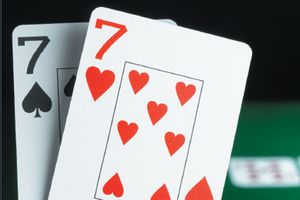In the early rounds of big tournaments, the blind structure is usually small enough that you can play a bit more reckless than you normally would. Not only will this keep your opponents on their toes, it is good strategy for setting up later play, especially if you will be at the same table for a while. First round action is generally not representative of how the final table will look; in other words, the chip leader at the end of round one seldom makes the cut for the final table.
Why is it correct to play more loosely in the first round? For starters, the risk is smaller. If you lose a few small hands, it won’t affect you too much for later play. It is much better to risk your chips when they are more plentiful and less meaningful. Also, it is much easier to come back from a deficit should you lose chips in the first round. By playing more loosely here, you stand to have more to gain than you do to lose.
The second reason is advertising. If your table stays together for a while, the others at the table will remember your reckless play and many will have a lasting impression of this. For you, this means more callers and re-raisers in later rounds when you have monster hands. By risking a little bit early in the tournament, you stand the chance of winning a whole lot more in the latter rounds.
 If players are stronger and are playing fewer hands, they are generally going to be harder to beat because of the fact that the few hands that they do play will be much better. When you are caught in a heads up situation with one of these players, you can sometimes take advantage of their tight play by bluffing. This will only work if you have created an image for yourself that says you only play the best hands as well. In this case, you can create the illusion that the hand you are playing is better than these players’ own good hands. If you are going to bluff, remember that bluffs will not work regularly against these players. Because they are better players, they will be able to quickly catch on to the fact that you are playing less than stellar hands. Masking your play is important, but bluffs will certainly not take the place of sound fundamentals within your play.
If players are stronger and are playing fewer hands, they are generally going to be harder to beat because of the fact that the few hands that they do play will be much better. When you are caught in a heads up situation with one of these players, you can sometimes take advantage of their tight play by bluffing. This will only work if you have created an image for yourself that says you only play the best hands as well. In this case, you can create the illusion that the hand you are playing is better than these players’ own good hands. If you are going to bluff, remember that bluffs will not work regularly against these players. Because they are better players, they will be able to quickly catch on to the fact that you are playing less than stellar hands. Masking your play is important, but bluffs will certainly not take the place of sound fundamentals within your play. 


